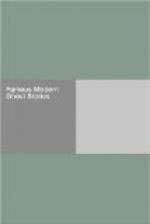On this dreadful day, then, when three hundred thousand men in arms with all their artillery swelled like a flood against the little English company, there was one point above all other points in our battle line that was for a time in awful danger, not merely of defeat, but of utter annihilation. With the permission of the Censorship and of the military expert, this corner may, perhaps, be described as a salient, and if this angle were crushed and broken, then the English force as a whole would be shattered, the Allied left would be turned, and Sedan would inevitably follow.
All the morning the German guns had thundered and shrieked against this corner, and against the thousand or so of men who held it. The men joked at the shells, and found funny names for them, and had bets about them, and greeted them with scraps of music-hall songs. But the shells came on and burst, and tore good Englishmen limb from limb, and tore brother from brother, and as the heat of the day increased so did the fury of that terrific cannonade. There was no help, it seemed. The English artillery was good, but there was not nearly enough of it; it was being steadily battered into scrap iron.
There comes a moment in a storm at sea when people say to one another, “It is at its worst; it can blow no harder,” and then there is a blast ten times more fierce than any before it. So it was in these British trenches.
There were no stouter hearts in the whole world than the hearts of these men; but even they were appalled as this seven-times-heated hell of the German cannonade fell upon them and overwhelmed them and destroyed them. And at this very moment they saw from their trenches that a tremendous host was moving against their lines. Five hundred of the thousand remained, and as far as they could see the German infantry was pressing on against them, column upon column, a gray world of men, ten thousand of them, as it appeared afterwards.
There was no hope at all. They shook hands, some of them. One man improvised a new version of the battle-song, “Good-by, good-by to Tipperary,” ending with “And we shan’t get there.” And they all went on firing steadily. The officer pointed out that such an opportunity for high-class fancy shooting might never occur again; the Tipperary humorist asked, “What price Sidney Street?” And the few machine guns did their best. But everybody knew it was of no use. The dead gray bodies lay in companies and battalions, as others came on and on and on, and they swarmed and stirred, and advanced from beyond and beyond.
“World without end. Amen,” said one of the British soldiers with some irrelevance as he took aim and fired. And then he remembered—he says he cannot think why or wherefore—a queer vegetarian restaurant in London where he had once or twice eaten eccentric dishes of cutlets made of lentils and nuts that pretended to be steak. On all the plates in this restaurant there was printed




